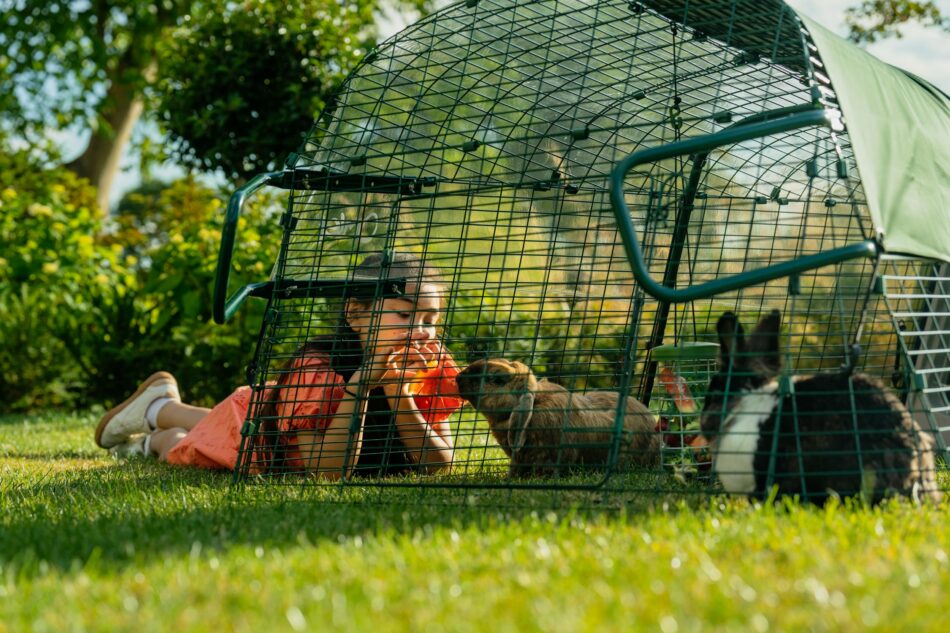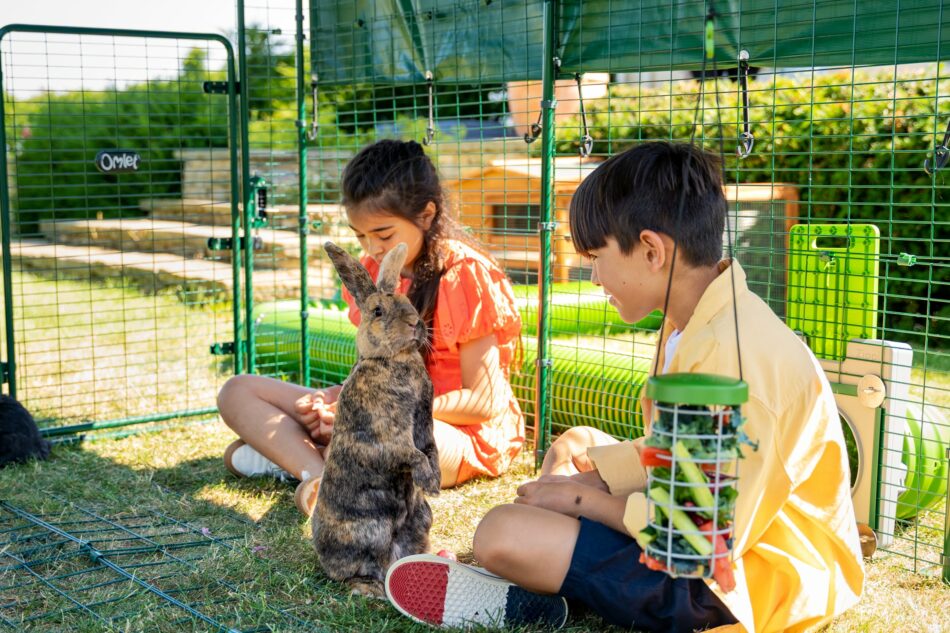What fresh produce should I feed my rabbits?
 Did you know that rabbits can enjoy a variety of fresh produce? In addition to their dietary staples, bunnies can safely nibble on nutritious garden vegetables and small amounts of fruit. Find out what fresh produce you should be feeding your rabbits, how much, and the benefits of offering them fresh treats.
Did you know that rabbits can enjoy a variety of fresh produce? In addition to their dietary staples, bunnies can safely nibble on nutritious garden vegetables and small amounts of fruit. Find out what fresh produce you should be feeding your rabbits, how much, and the benefits of offering them fresh treats.
What should I feed my bunnies?
First and foremost, rabbits should be fed a quality pellet diet made up mainly of timothy hay. The protein content should fall between 12-16% for most breeds of rabbits, and the fiber content should be at least 15%. Free choice access to loose timothy hay should always be available to help keep their digestion moving smoothly and keep their front teeth trimmed through continuous gnawing. Your rabbits should also have access to fresh, clean water at all times, which thanks to the Eglu Go Rabbit Hutch, is made easy. Simply open the single large door at the back of your rabbits’ enclosure to reveal the bedding tray and access the complimentary hay rack and water bottle.
Anything that’s offered in addition to these dietary staples should be considered treats. Fresh produce is a much healthier alternative to pre-packaged rabbit treats that are commercially available, but should still only be offered a few times a week. Rabbit-safe fruits can also be offered, but in moderation, as they are high in sugar. These foods are not readily available to wild rabbits – and while your domesticated bunnies may have all of their needs provided by you, their digestive system is still very similar to their cousins in the wild. By replicating the diet that rabbits stick to in the wild, you’ll help your pet bunnies maintain a healthy lifestyle.
Rabbit-safe fresh produce
There are several rabbit-safe foods that can be found in grocery stores, home gardens, or even in your own backyard. Fresh produce should be served in a separate feeder than their regular diet to keep their run clean. A hanging treat holder is perfect for serving up fresh foods to keep them away from insects and to give your rabbits a new angle on snacktime.
Some fresh produce is healthier than others, while some should be avoided entirely. This list isn’t comprehensive, but it includes the most common fresh produce that can be offered to rabbits.
Vegetables
Veggies can be offered several times a week, with a few exceptions. Spinach contains oxalic acid, which in high amounts can cause digestive upset in rabbits. Sweet potatoes are also a favorite among bunnies, but are very starchy, so they should be offered sparingly.
Vegetables that are safe and nutritious for rabbits include:
- Asparagus
- Bell pepper
- Broccoli
- Brussel Sprouts
- Cabbage – red, savoy and kale
- Carrot tops (more on carrots later)
- Cauliflower leaves and stalks
- Celery
- Chicory
- Cucumber
- Lettuce – romaine or green leaf
- Parsnip
- Radish
- Spinach (no more than once a week)
- Sweet potatoes (sparingly)
- Turnips
- Watercress
- Zucchini
Carrots – not a rabbit’s best friend
Rabbits are so closely associated with carrots that it’s hard to fathom that they might not actually be that good for them. From Peter Rabbit to Bugs Bunny, fictional rabbits love carrots – and real bunnies love them too. But, carrots are high in sugar and calories, but lack the fiber needed for a rabbit to digest them properly. A carrot-heavy diet can cause constipation in rabbits, and make blood sugar levels rise dangerously. Carrots should be fed as fruits are – fine as an occasional treat, but only offered in moderation.
Fruits
Fruit should be offered in small amounts, no more than 1-2 times per week. Don’t offer fruit to rabbits less than 7 months of age, as their young digestive system may be upset by the sugar content.
Rabbit-friendly fruits include:
- Apples
- Bananas
- Berries – Blueberries, blackberries, raspberries, and strawberries
- Kiwi
- Melon (without the rind) – cantaloupe, watermelon and honeydew
- Pears
- Tomatoes
Herbs and plants
Wild rabbits eat a wide variety of plants, and even wood and bark. There are many forage plants that you can feed your pet rabbits, but not all native fauna is fair game. Never offer a wild plant to your rabbits unless you’re confident in identifying safe types. And, always make sure that wild plants haven’t been sprayed with fertilizers or pesticides – most of which are harmful or even fatal to rabbits.
Herbs and plants that are safe for rabbits include:
- Basil
- Berry leaves – blackberry, raspberry and strawberry
- Clover
- Dandelions – flowers and stems
- Dill
- Grass – fresh stalks, not lawn clippings that may contain other plant matter
- Mint
- Oregano
- Parsley
- Plantain
- Rose – leaves, petals, and stalks
- Rosemary
- Sunflowers
- Yarrow
Dangerous plants and vegetables
Some fresh foods are bad for bunnies. These plants affect your rabbits in many ways, ranging from mild discomfort to being toxic even in small amounts. If you suspect your rabbit has eaten any of the following, keep a close eye on them and call your veterinarian if you notice any unusual behavior.
Never feed your rabbits:
- Aubergines
- Avocados
- Bamboo shoots
- Beans
- Chives
- Garlic
- Iceberg lettuce
- Nuts
- Onion
- Peas
- Potatoes (sweet potatoes are fine)
- Rhubarb
- Tomato leaves (in large quantities)
Feeding your rabbits with Omlet
Finding fresh produce for your rabbits is a fun way to diversify their diet and deepen your bond with them. Offering their fresh foods in a Caddi Rabbit Treat Holder keeps their rabbit hutch and run clean and reduces potential waste. Or, build your bunnies a custom burrow with our Zippi Rabbit Tunnel System and strategically place their snacks along the way. However you choose to treat your pets, we’re here to support your rabbits’ healthy habits.
This entry was posted in Rabbits
